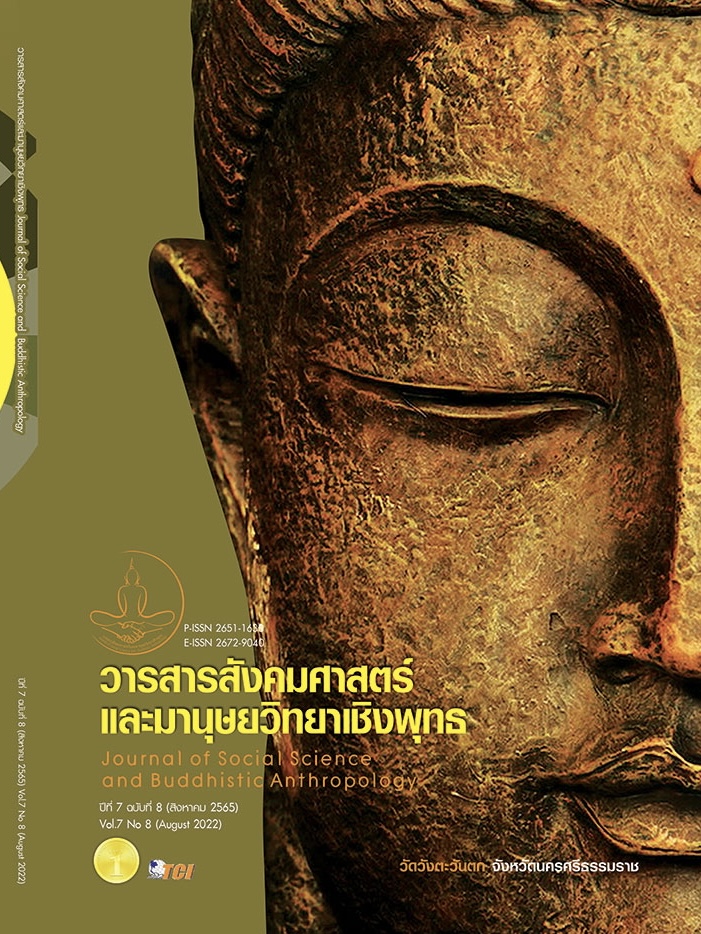THE ROLE OF BEAUTY QUEEN IN THAI SOCIETY
Keywords:
Role, Beauty Queen, Thai SocietyAbstract
The objectives of this research article were to study the role of beauty queen in Thai society. This is qualitative research, the data collecting was sought by the documents, textbooks, articles, e-documents related as well as in-depth interviews conducted with the winner of the beauty pageant. The content analysis was employed to analyze the data. The finding showed that the role of beauty queen in Thai society as follows: family role, beauty queen has to completed their roles as children, wife and mother role throughout their lives. Educational role, beauty queen should know both from educational institutions, knowledge that come from experience or education according to one's aptitude. In addition, beauty queen should contribute to transfer of knowledge in their fields of expertise for social service also. Religious role, the beauty queen takes part in the upkeep of her religion according to the time and opportunity, as well as in the production of the national culture especially in international competitions. Occupational role, beauty queen should work that does not violate the law. Social role, beauty queen plays an important role in driving society as beauty queen influence decision-making. The influence of ideas or motivations of people in society. Political role, as a citizen, beauty queen was involved in political activities. and mass media role, beauty queens should use the media as a means of publicizing or stealing issues driven by individual beauty queen based on the ethics and laws of media use.
References
กัญญภัค แมกกี้. (2562). เพศสภาพและบทบาทสตรีในฐานะอุบาสิกาตามทรรศนะ ทางพระพุทธศาสนา. วารสารพุทธมัคค์ศูนย์วิจัยธรรมศึกษาสำนักเรียนวัดอาวุธ วิกสิตาราม, 4(2), 54-60.
ชลิต เฉียบพิมาย และคณะ. (2563). บทบาทของอินเตอร์เน็ต เทคโนโลยีดิจิทัล และสื่อสังคมในช่วงการแพร่ระบาดของไวรัสโคโรน่าสายพันธุ์ใหม่ (โควิด-19). ใน รายงานสืบเนื่องการประชุมวิชาการระดับชาติเวทีวิจัยมนุษยศาสตร์ไทย ครั้งที่ 14 (น.13-25). นครปฐม: มหาวิทยาลัยมหิดล.
ชาย โพธิสิตา. (2562). ศาสตร์และศิลป์แห่งการวิจัยเชิงคุณภาพ. (พิมพ์ครั้งที่ 8). กรุงเทพมหานคร: อมรินทร์พริ้นติ้ง.
ธาราทิพย์ สุขดรุณพัฒน์ และศุภชาต เอี่ยมรัตนกูล. (2561). ภาพลักษณ์ของการประกวดนางงามต่อสังคม. วารสารเกษตรศาสตร์ธุรกิจประยุกต์, 11(14), 38-52.
ปิ่นศิริ ศิริปิ่น. (2556). วินทุกเว(ที). กรุงเทพมหานคร: บริษัท ออฟเซ็ท พลัส จำกัด.
พชร คณะมะ และอลงกรณ์ อรรคแสง. (2563). ประสิทธิผลของกองทุนพัฒนาบทบาทสตรี ในการพัฒนาบทบาทสตรีจังหวัดมหาสารคาม. วารสารสถาบันวิจัยและพัฒนา มหาวิทยาลัยราชภัฏมหาสารคาม, 7(1), 153-162.
พรเพชร วิชิตชลชัย. (2561). บทบาทสตรีไทยในยุคไทยแลนด์ 4.0. ใน สารสภานิติบัญญัติแห่งชาติ. กรุงเทพมหานคร: สำนักประชาสัมพันธ์.
ราชบัณฑิตยสถาน. (2546). พจนานุกรมฉบับราชบัณฑิตยสถาน พ.ศ. 2542. กรุงเทพมหานคร: นานมีบุ๊คส์.
รุ้งนภา ยรรยงเกษมสุข และสุมิต อินทวงศ์. (2557). การประกวดนางงามดับระบบชายเป็นใหญ่ในพื้นที่สาธารณะ. วารสารเศรษฐศาสตร์การเมืองบูรพา, 3(1), 83-105.
วรพงษ์ ปลอดมูสิก และฐิตินัน บุญภาพ คอมมอน. (2561). การสื่อสารอัตลักษณ์ความงาม ผ่านกิจกรรมการประกวดมิสแกรนด์ไทยแลนด์. วารสารนิเทศศาสตร์, 36(2), 34-51.
วราวุฒิ องค์การ และชาญชัย จิวจินดา. (2563). ผลสำเร็จของกองทุนพัฒนาบทบาทสตรี กรณีศึกษา อำเภอขาณุวรลักษบุรี จังหวัดกำแพงเพชร. วารสารนวัตกรรมการบริหารและการจัดการ, 8(2), 23-32.
วิภาพรรณ อุปนิสากร และคณะ. (2559). การพัฒนาบทบาท ทางการเมืองของสตรี. ธรรมทรรศน์, 16(3), 51-61.
สมศรี บัวทอง. (2551). บทบาทของสตรีในกิจกรรมการพัฒนาท้องถิ่น: ศึกษากรณีองค์การบริหารส่วนตำบลกระแสบน อำเภอแกลง จังหวัดระยอง. ใน วิทยานิพนธ์รัฐประศาสนศาสตรมหาบัณฑิต สาขาวิชาการปกครองท้องถิ่น. มหาวิทยาลัยขอนแก่น.
สำนักงานกองทุนพัฒนาบทบาทสตรี. (2562). ยุทธศาสตร์กองทุนพัฒนาบทบาทสตรี. กรุงเทพมหานคร: สำนักงานกองทุนพัฒนาบทบาทสตรี กรมการพัฒนาชุมชน.
สิน พันธุ์พินิจ. (2554). เทคนิคการวิจัยทางสังคมศาสตร์. กรุงเทพมหานคร: บริษัทจูน พับลิชชิ่ง จำกัด.
สุพัตรา กอบกิจสุขสกุล. (2531). การประกวดนางสาวไทย (พ.ศ. 2477-2530). ใน วิทยานิพนธ์ศิลปศาสตรมหาบัณฑิต สาขาประวัติศาสตร์. มหาวิทยาลัยธรรมศาสตร์.
Biddle, J. (1986). Recent developments in role theory. Annual Review of Sociology, 12(1), 67-92.
Denzin, N. (1978). Sociological Methods: A Sourcebook. NY: McGraw Hill.
Mercer, T. & Ferketish, W. (1994). Maternal-infant attachment of experienced and inexperienced mothers during infancy. Nursing Research, 43(6), 344-351.
Nastasi, K. & Schensul, L. (2005). Contributions of qualitative research to the validity of intervention research. Journal of School Psychology, 43(3), 177-195.
United Nations. (2015). Sustainable Development Goals. New York: United Nations Department of Economic and Social Affairs. Retrieved December 11, 2020, from https://sustainabledevelop ment.un.org/partnerships/
Downloads
Published
How to Cite
Issue
Section
License
Copyright (c) 2022 Journal of Social Science and Buddhistic Anthropology

This work is licensed under a Creative Commons Attribution-NonCommercial-NoDerivatives 4.0 International License.









